'An astonishing scumbag move': Indie developers react to surprise Unity engine pricing changes
Unity's new Runtime Fee will charge developers on a per-install basis.
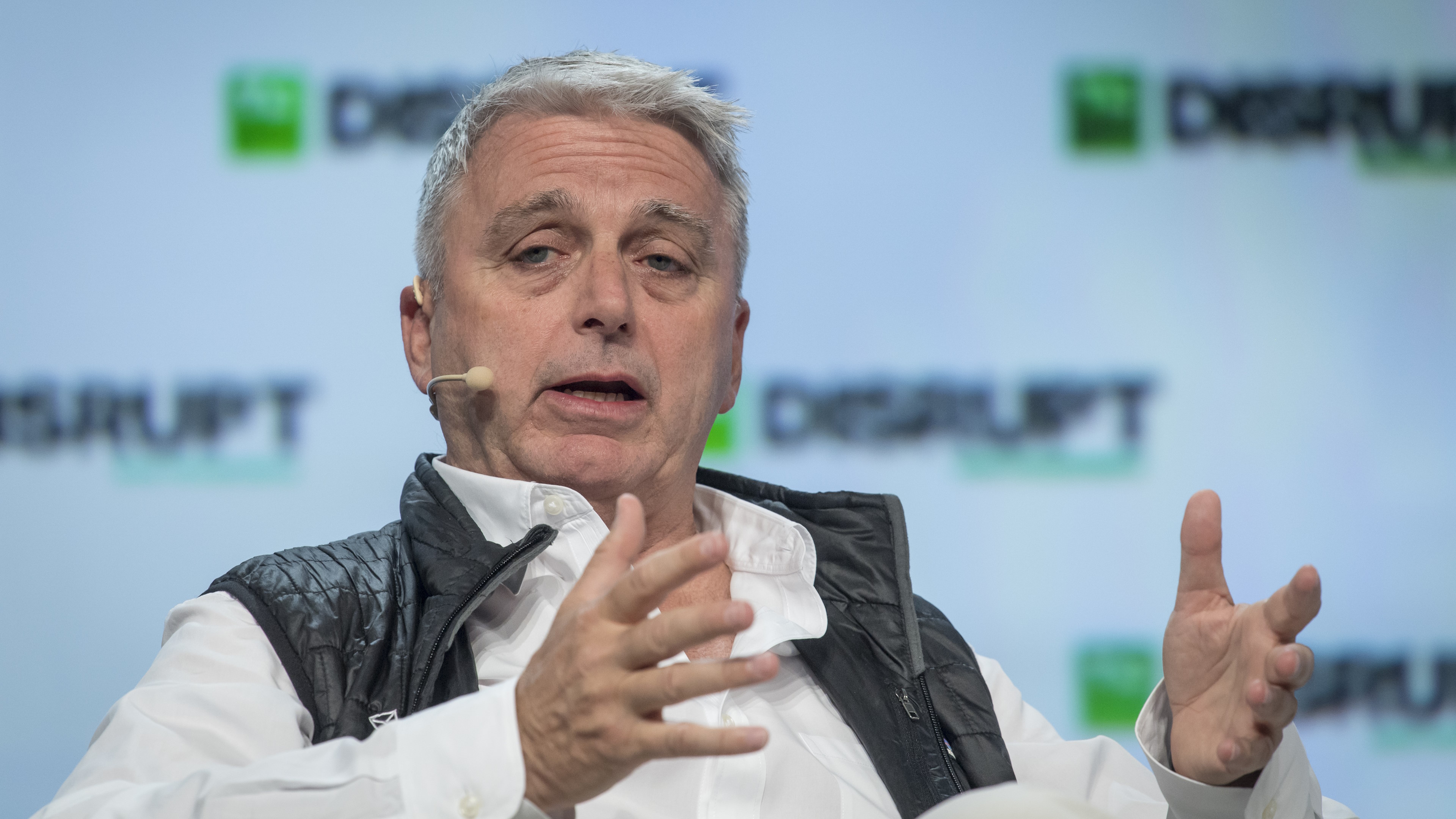
Indie game developers are up in arms over changes to Unity's pricing system that will see them charged on a per-install basis once certain thresholds are met. The developers say the changes could end up costing them more than their games will ever actually make, and worse, leaves them vulnerable to abuse and impacts their ability to take part in game giveaways, bundles, and and even subscription services like Game Pass.
On January 1, 2024, Unity will start charging developers a new "Unity Runtime Fee" that will apply every time a game is installed after a game passes minimum revenue and install count thresholds. For users of Unity Personal, which is free, and Unity Plus, those thresholds are $200,000 over the past 12 months, and 200,000 lifetime installs—after those numbers are surpassed, developers will have to pay Unity 20 cents per install. Higher cost versions of Unity have higher thresholds and lower per-install fees.
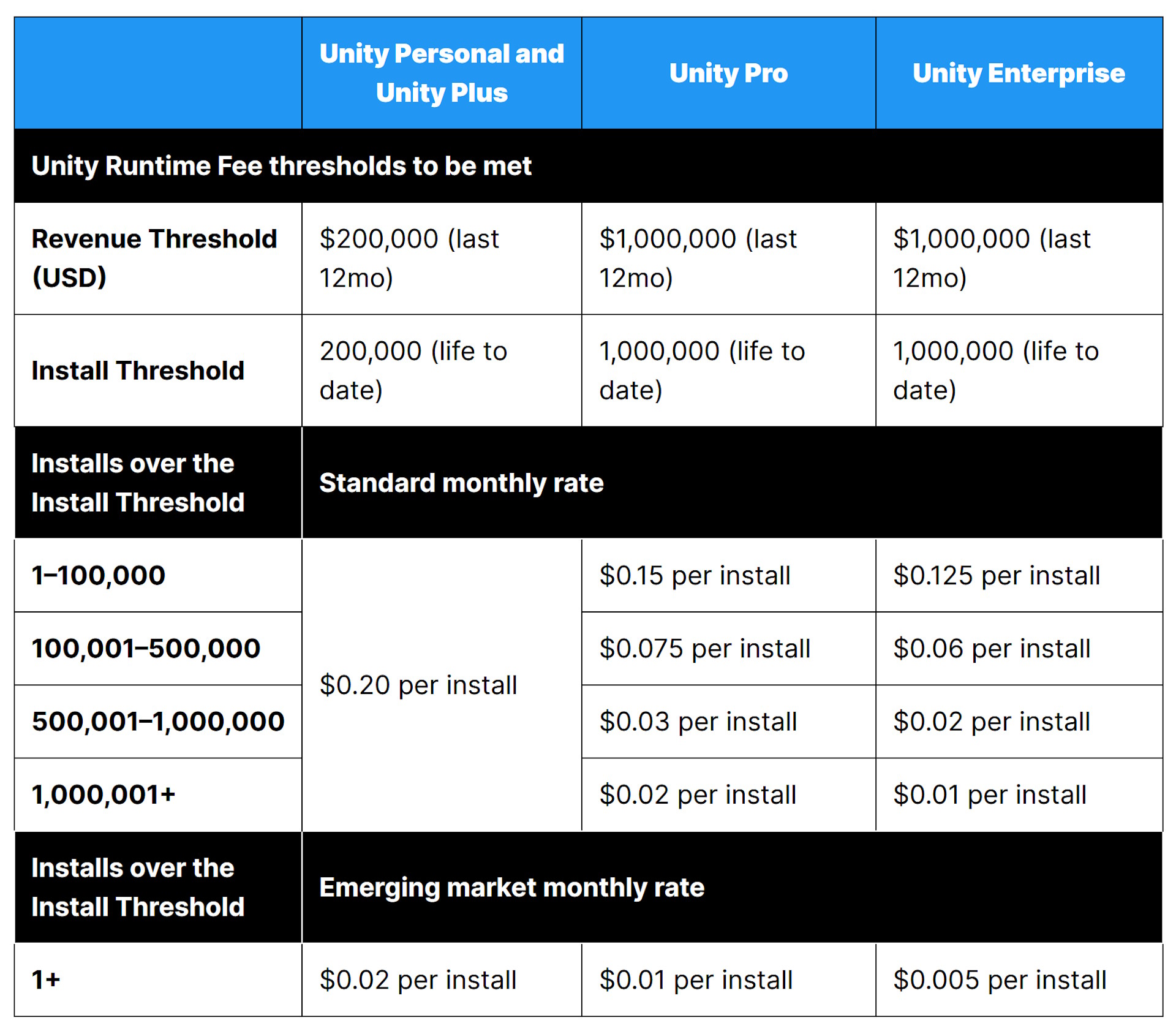
On the face of it, it seems like a reasonable deal: If you, a solo developer, make $200,000 in a year off a little indie game you cooked up in Unity, paying a small fraction of what you earn on sales on top of that hardly seems unusual. After an Unreal Engine game makes $1M in revenue, for example, Epic collects 5% of all future revenue. But indie developers were almost unanimously outraged by the change: Tom Francis, the designer and coder of Heat Signature, described the change as "an astonishing scumbag move."
Francis' major complaint wasn't the new fee structure itself, but the way Unity imposed it on developers who have already released games using the Unity engine: The Unity Runtime Fee FAQ says the new charge "applies to eligible games currently in market that continue to distribute the runtime" after January 1.
"A partner who can and will change how much of your revenue you owe them *after* you've made and released your game needs to be avoided like the plague," Francis tweeted. "I hadn't realised they even legally could. I gather Epic's Unreal license is perpetual per-version, so whatever the deal is when you commit, you're guaranteed that forever if you're happy to stick with that version.
"[Epic's] 5% is more than Unity's new fees in most scenarios, but compared to a company that can help themselves to any amount of your money at any time, suddenly sounding more reasonable."
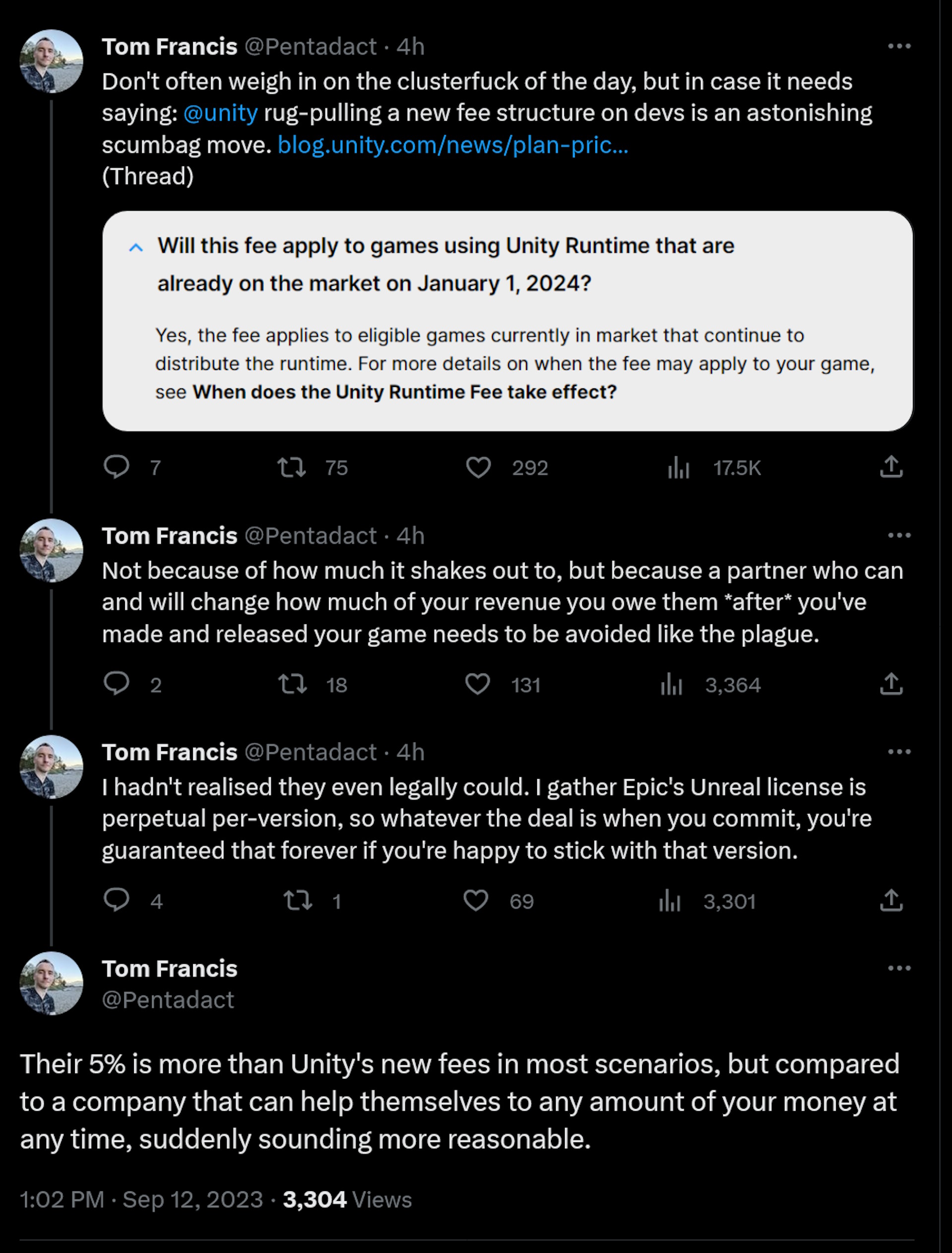
Similar sentiments were shared by The Falconeer developer Tomas Sala, who wrote that he's already committed to the Unity engine for his new game, and has put "years and years of work" into it.
Keep up to date with the most important stories and the best deals, as picked by the PC Gamer team.
"I did so under a simple per seat license I am happy to pay. Now while I am close to release they spring something new on me," Sala wrote. "Not a price increase a fundamental change in how we do business together. I have no options, cannot go back, can only bend and payup. It's form of blackmail. It's not dependable. How will they change it two years from now, a decade? It is gross and It makes me want to go somewhere else with my business."
Gloomwood developer Dillon Rogers said that even if Unity walks this policy back completely, "the damage is done" in his view: "You cannot trust a partner who will alter the deal after it's done."
if you buy our Unity game, please don't install itSeptember 12, 2023
While some focus on the uncertainty Unity's unexpected new deal has introduced to the long game development process, other developers say they face a very real financial threat from the change, too.
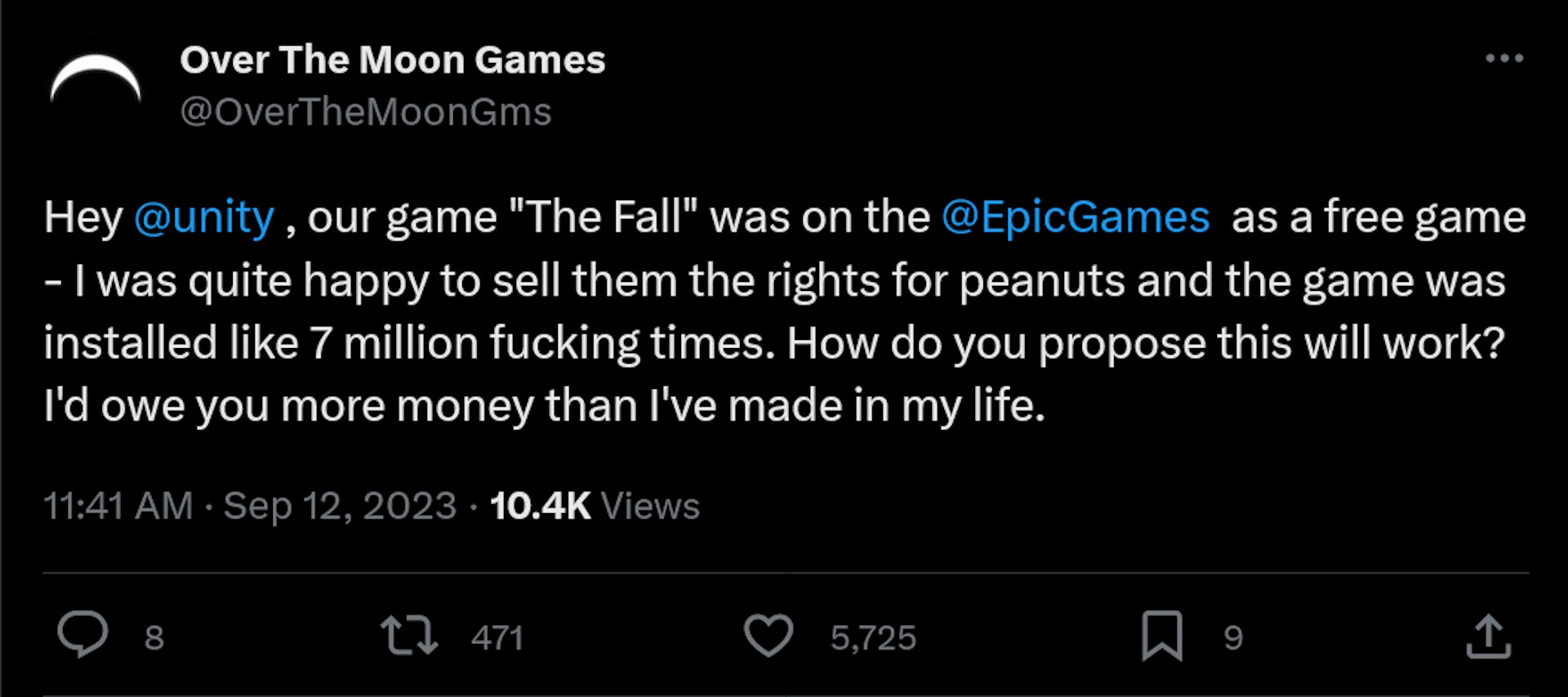
"Hey @unity, our game The Fall was on the @EpicGames as a free game - I was quite happy to sell them the rights for peanuts and the game was installed like 7 million fucking times," Over the Moon Games tweeted. "How do you propose this will work? I'd owe you more money than I've made in my life.
"To be clear, the 'more than I've made in my life' is an obvious exaggeration," the studio clarified in a follow-up tweet. "I would owe them three times what Epic paid me."
Necrosoft Games director Brandon Sheffield used the example of Vampire Survivors, a $5 indie on Steam that became one of the biggest games of 2022, to dive into the topic in a blog post pointedly entitled The Death of Unity.
"Vampire Survivor's edge was their price, now doing something like that is completely unfeasible," Sheffield wrote. "Imagine releasing a game for 99 cents under the personal [Unity] plan, where Steam takes 30% off the top for their platform fee, and then Unity takes 20 cents per install, and now you're making a maximum of 46 cents on the dollar.
"As a developer who starts a game under the personal plan, because you're not sure how well it'll do, you're punished, astoundingly so, for being a breakout success. Not to mention that sales will now be more costly for developers since Unity is not asking for a percentage, but a set fee. If I reduce the price of my game, the price unity asks for doesn't decrease."
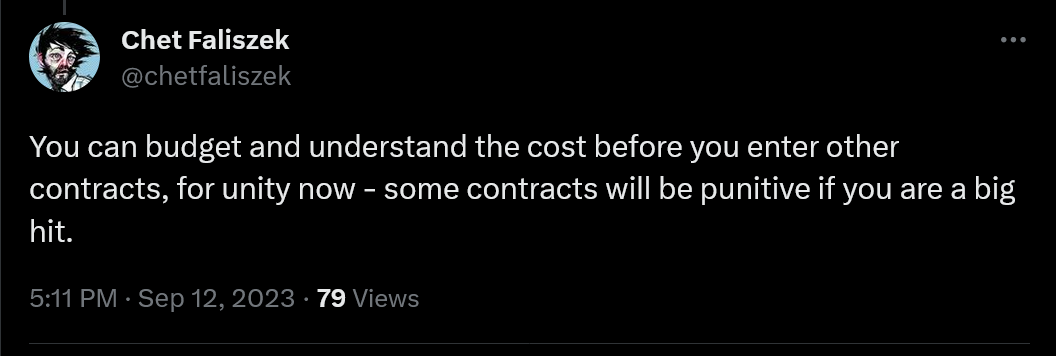
On top of all that, indie developer and consultant Rami Ismail told PC Gamer that the new fee system opens the door to all sorts of potential abuse. "Say I have a user who doesn't like me, and they decide to install my game on a hundred devices, which you can fairly easily do—spin up some virtual machines, turn on a VPN, just spoof a hundred installs," Ismail said. "Now there's a hundred installs. Now, Unity does not have insight into my revenue, right? But they do have insight into the installs, so as far as they're concerned, they're now owed a few thousand dollars. But I didn't earn anything!
"The problem is that what they're charging for is something that does not make money. An install does not make us money."
For the same reason, Unity's new policy may also throw up roadblocks for developers who want to do game giveaways, take part in charity bundles, or sign up for subscription services like Game Pass. Unity told Stephen Totilo of Axios that charity bundles are exempt from the fee, but how can it tell where a game install actually originated from? It also clarified that if a user uninstalls a game and then reinstalls it, that counts as two separate installs and thus two charges—although the company later walked back that part of the policy.
"Say we have a game, we make $200,000, we make a really nice deal with Microsoft, and on Microsoft it gets downloaded, you know, 15 million times," Ismail said. "Am I going to pay 20 cents over 15 million installs?"
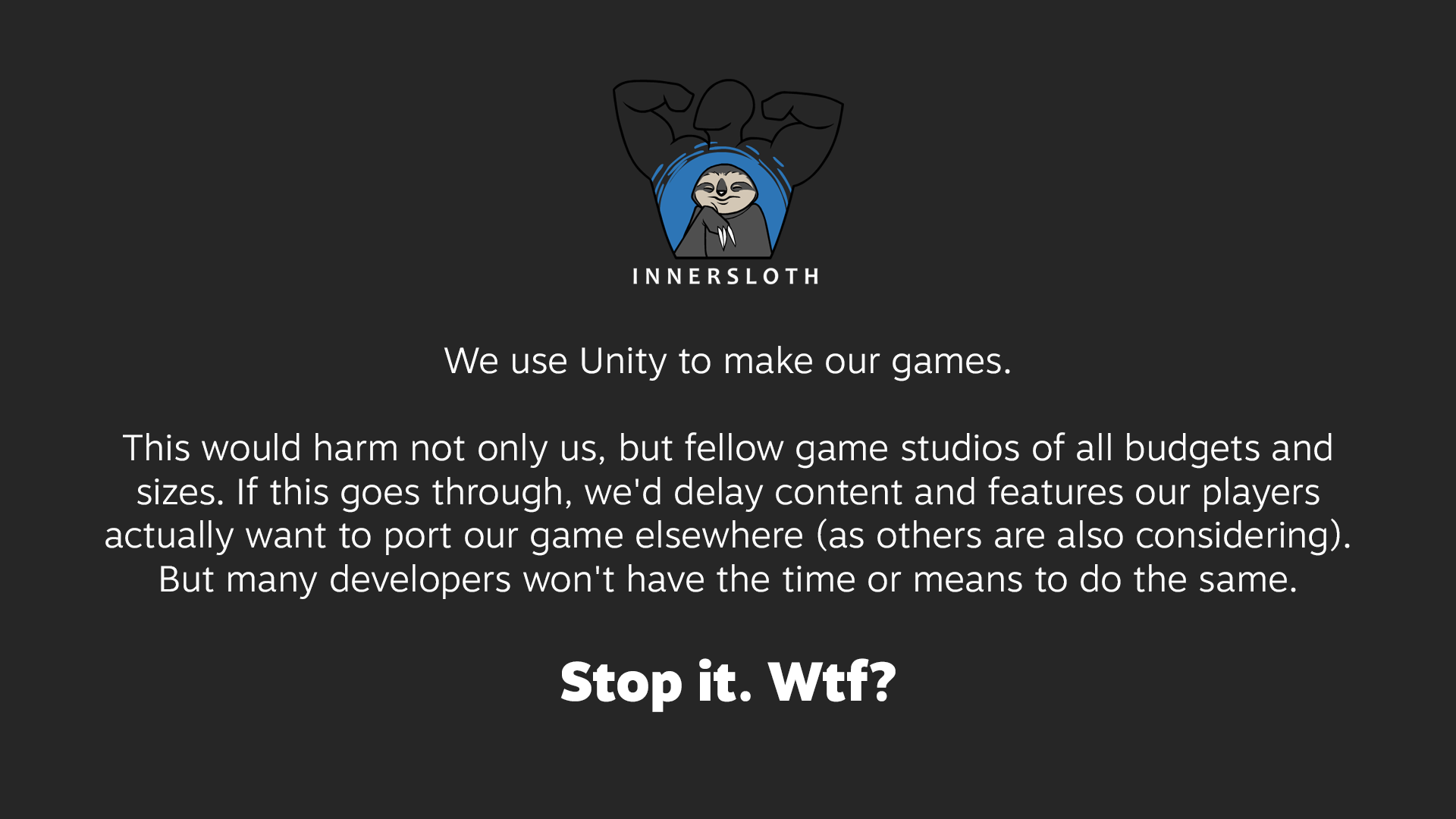
One big issue is the lack of clarity on how exactly the new policy will work: Ismail said the only thing developers have to go by at this point is Unity's public statement. In response to the backlash, Unity repeated its initial claim that the new fee system "will only affect a small subset of current Unity Editor users," and that the "large majority" of users will continue to pay nothing.
"The developers who will be impacted are generally those who have successful games and are generating revenue way above the thresholds we outlined in our blog," Unity tweeted. "This means that developers who are still building their business and growing the audience of their games will not pay a fee. The program was designed specifically this way to ensure developers could find success before the install fee takes effect."
Unity also said that it is "actively listening to and following your questions closely," and invited concerned developers to "discuss these changes" on its forums.
At the same time, there was a sort of tacit acknowledgement that there might be some rough waters ahead: In a reply to inquiries about potentially fraudulent behavior that it repeated a half-dozen times, Unity said, "We do already have fraud detection practices in our Ads technology which is solving a similar problem, so we will leverage that know-how as a starting point. We recognize that users will have concerns about this and we will make available a process for them to submit their concerns to our fraud compliance team."
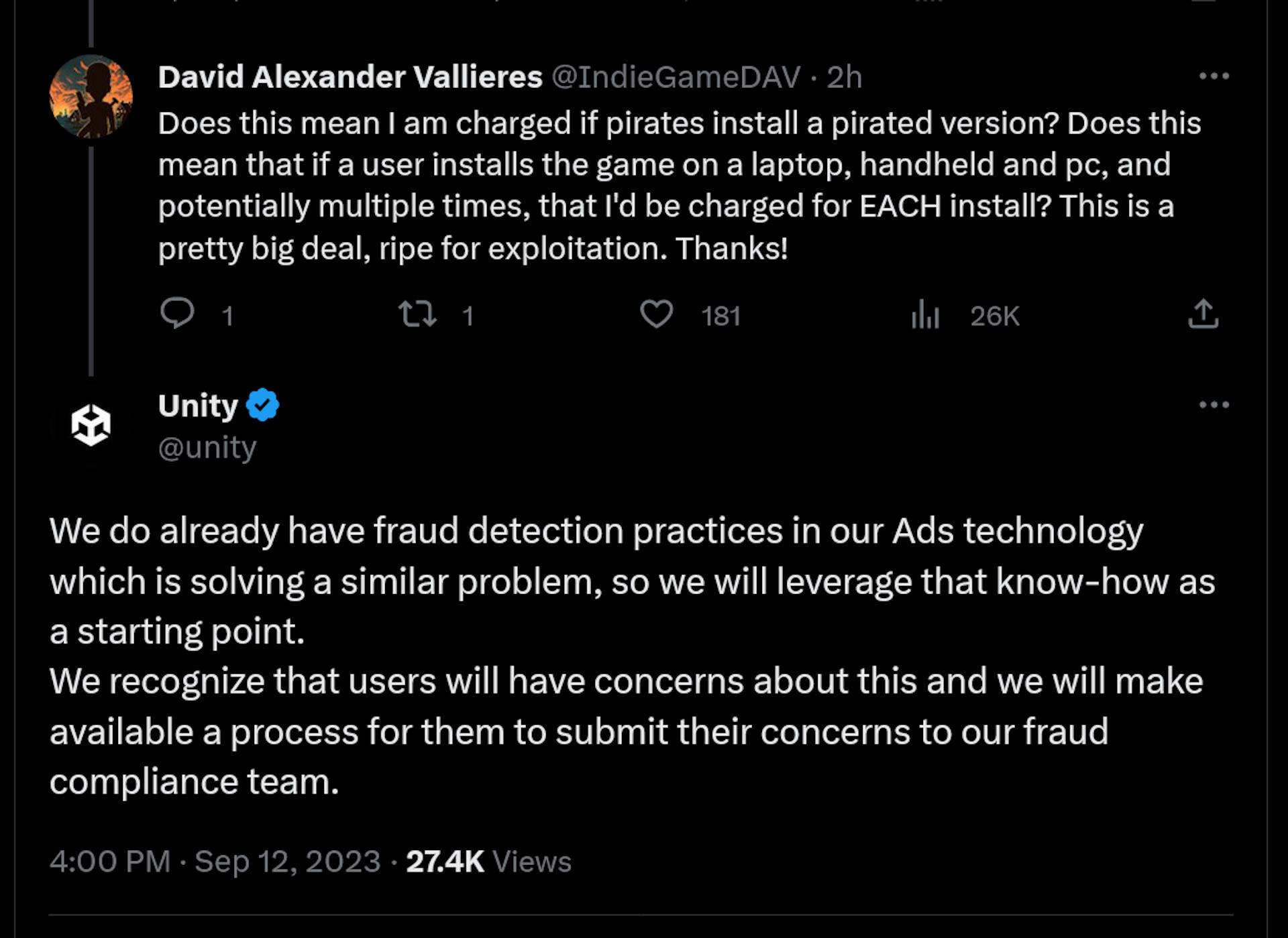
It's not exactly an iron-clad assurance, and numerous developers vowed that they will no longer use the Unity engine in their projects. Switching engines mid-stream is no small task, but Ismail said he's already spoken to a number of other developers looking to make the change, and that Unreal Engine maker Epic Games has the opportunity to take advantage of the situation.
"Epic has something called the Mega Grant that they use to support developers making things in Unreal," he said. "I would guess that if Unreal throws two million dollars at it in the next few months, they could convert a number of fairly large community developers over."
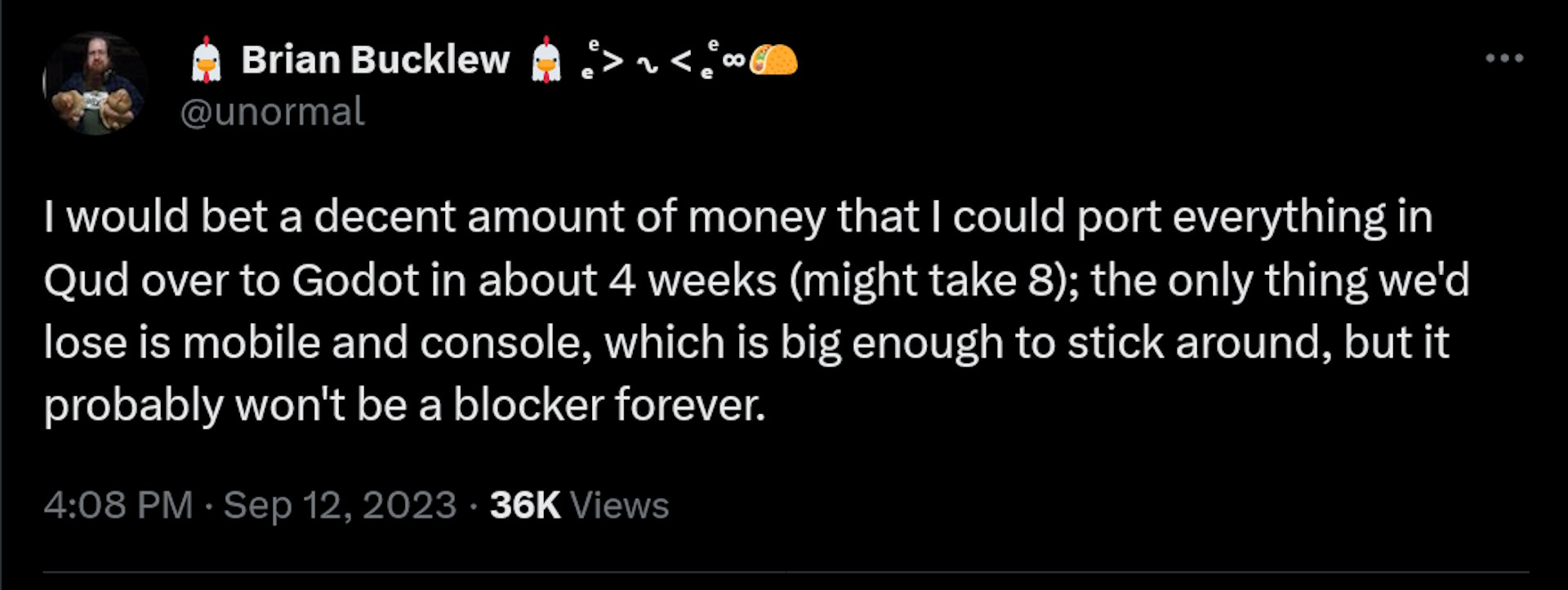


SIGH pic.twitter.com/YgJEKGVQEISeptember 12, 2023
Ismail also took issue with Unity's claim that the change will only be relevant to a very small portion of the people who use the engine: "I make roguelikes," he said. "I can tell you that even things with a 0.001% chance will happen."
In a statement sent to PC Gamer, a Unity spokesperson said that "qualifying charities" will not be charged for installs, although how it will tell a game acquired in a charity bundle from one purchased through normal channels—or how it will handles cases where someone who already owns a particular game picks up another copy in a relevant bundle—wasn't explained. In order to avoid cases of developers being charged for false or fraudulent installs, Unity plans to "leverage the fraud detection practices that we’ve been using in our ads technology as a starting point to get us ready before January 2024," the spokesperson said.
The spokesperson also clarified that developers would need to surpass both the revenue and install thresholds before the install fee applied.
"We have been in touch with Unity developers who are cumulatively meeting the install and revenue thresholds (a large majority of which are not indie developers) and having conversations with them," the rep said. "For folks we haven’t been able to reach, we are encouraging them to reach out to us."
Update: Just hours after the new Runtime Fee policy was announced, Unity has told Axios that it has now changed direction on the "multiple installs = multiple charges" policy after "regrouping" to discuss the issue following the strong pushback from developers. A representative said that uninstalling and then reinstalling a game will not result in multiple charges, which Unity hopes will allay fears of "install-bombing."
However, installing a game on multiple devices, such as a PC and Steam Deck, will still result in multiple charges; it would also seem that the scenario described by Rami Ismail in which an angry user uses virtual machines to simulate multiple installs would still leave developers on the hook for charges.
Despite the partial walkback, some developers say they still plan to move from Unity to another engine. Aaron San Filippo of Whisker Squadron developer Flippfly, for instance, said he doesn't care if Unity reverts the new pricing scheme completely: "They’ve made it clear it’s not safe to work with this engine."
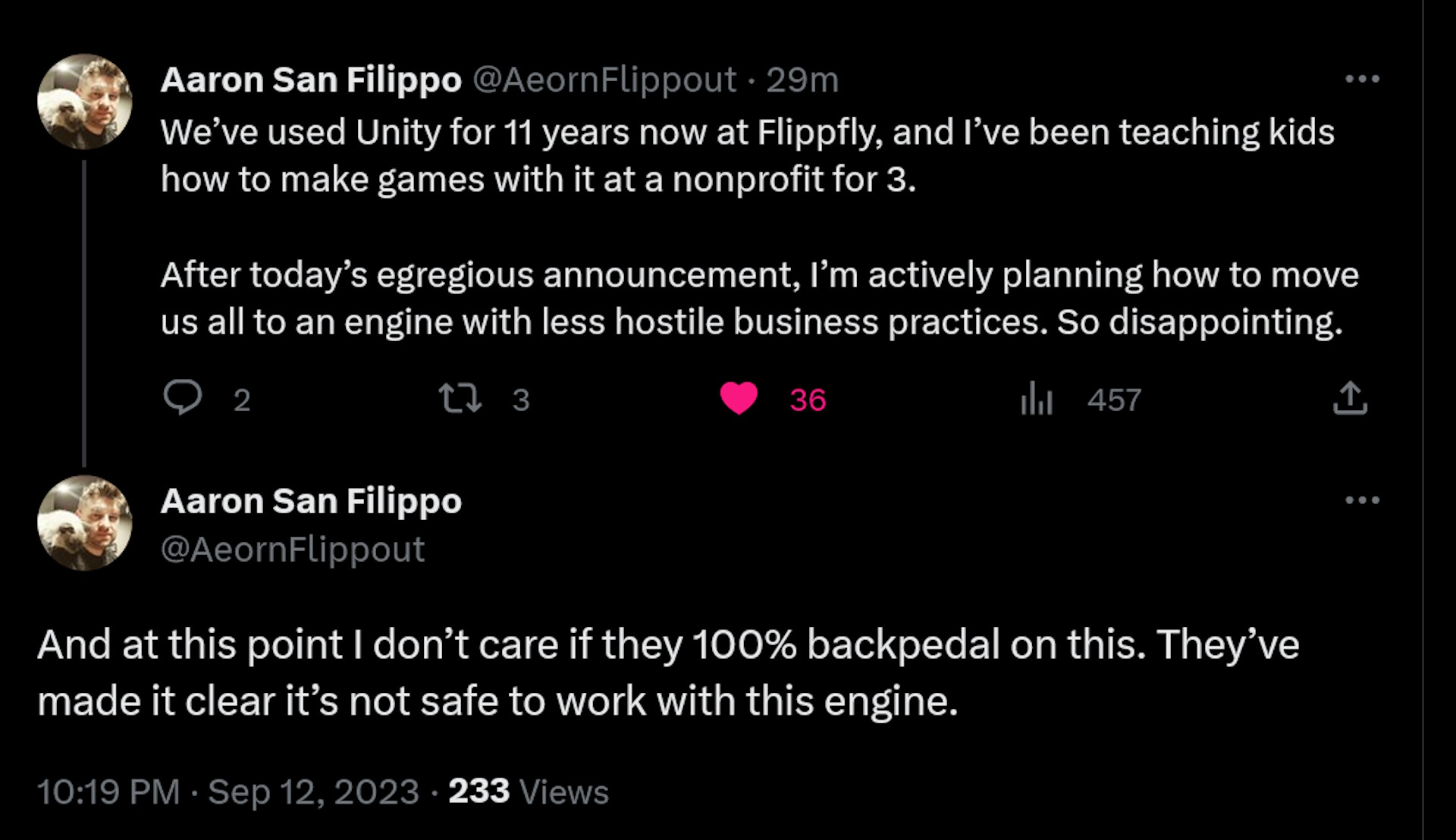

Andy has been gaming on PCs from the very beginning, starting as a youngster with text adventures and primitive action games on a cassette-based TRS80. From there he graduated to the glory days of Sierra Online adventures and Microprose sims, ran a local BBS, learned how to build PCs, and developed a longstanding love of RPGs, immersive sims, and shooters. He began writing videogame news in 2007 for The Escapist and somehow managed to avoid getting fired until 2014, when he joined the storied ranks of PC Gamer. He covers all aspects of the industry, from new game announcements and patch notes to legal disputes, Twitch beefs, esports, and Henry Cavill. Lots of Henry Cavill.

